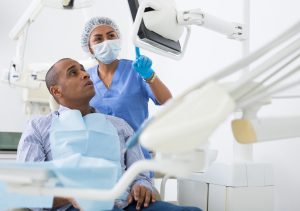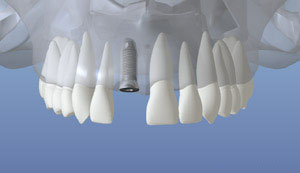After Your Same-Day Smile, What To Expect From Your New Bite
Are you considering Teeth-in-a-Day dental implants but wondering how they’ll affect your ability to enjoy your favorite foods? At Wright Perio & Implants in San Clemente, South Orange County, CA, we understand that restoring your smile is about more than just aesthetics – it’s about regaining full functionality and confidence in your daily life. 
In this comprehensive guide, San Clemente implant dentist, Dr. Raymond L. Wright Jr. explores the relationship between Teeth-in-a-Day implants and bite force, helping you set realistic expectations for your new smile. You can also learn more by calling our South Orange County dental practice at (949) 361-4867.
Understanding Teeth-in-a-Day
Teeth-in-a-Day, also known as All-on-4 or same-day dental implants, is a revolutionary procedure that allows patients to receive a full set of functional, aesthetically pleasing teeth in just one day. This innovative technique involves placing four to six dental implants in strategic locations in the jaw to support a full arch of prosthetic teeth.
The benefits of Teeth-in-a-Day include:
- Immediate results
- Reduced healing time
- Improved aesthetic appearance
- Enhanced quality of life
- Preservation of jawbone structure
While the procedure offers numerous advantages, many patients wonder how their new teeth will perform in terms of chewing ability and bite force compared to natural teeth or traditional dentures.
Bite Force: A Key Factor in Chewing Ability
Bite force is the amount of pressure your jaw muscles can exert when you clench your teeth together. It plays a crucial role in your ability to chew food effectively and comfortably. Several factors influence bite force, including:
- Jaw muscle strength
- Temporomandibular joint (TMJ) health
- Number and condition of teeth
- Age and gender
- Overall oral health
Natural teeth typically provide the highest bite force, with average measurements ranging from 200 to 250 pounds per square inch (psi). However, bite force can vary significantly among individuals and even between different areas of the mouth.
Teeth-in-a-Day and Initial Bite Force
Immediately after receiving Teeth-in-a-Day implants, patients often experience a reduced bite force compared to their natural teeth. This is entirely normal and expected for several reasons:
- Healing Process: The implants need time to fully integrate with the jawbone, a process called osseointegration.
- Protective Measures: To ensure proper healing, your dentist may recommend a softer diet initially to avoid putting excessive pressure on the new implants.
- Adjustment Period: Your brain and muscles need time to adapt to the new teeth and develop proper chewing patterns.
During the first few months after the procedure, patients typically experience about 20-40 percent of their natural bite force. This is still significantly higher than the bite force achieved with traditional dentures, which often provide only 5-10 percent of natural bite force.
Bite Force Improvement Over Time
The good news is that bite force with Teeth-in-a-Day implants improves significantly over time. As the implants integrate with the jawbone and patients become more accustomed to their new teeth, chewing ability and bite force increase steadily.
Here’s what you can expect in terms of bite force improvement:
- Three to Six Months Post-procedure: Bite force typically increases to 60-80 percent of natural teeth.
- Six to 12 Months Post-procedure: Many patients achieve 80-90 percent of their natural bite force.
- One Year and Beyond: Some patients report bite force comparable to or even exceeding their natural teeth, especially if they had compromised dentition before the procedure.
It’s important to note that individual results may vary, and factors such as overall health, adherence to post-operative care instructions, and regular dental check-ups can influence the rate and extent of improvement.
Factors Affecting Chewing Ability with Teeth-in-a-Day
While bite force is a crucial factor in chewing ability, it’s not the only consideration. Several other factors contribute to your overall chewing experience with Teeth-in-a-Day implants:
- Implant Placement: The strategic positioning of implants ensures optimal support and distribution of chewing forces.
- Prosthetic Design: The materials and design of your prosthetic teeth play a role in their durability and functionality.
- Occlusion: Proper alignment of your upper and lower teeth is essential for efficient chewing.
- Muscle Adaptation: As you adjust to your new teeth, your jaw muscles will adapt and become more efficient at chewing.
- Sensory Feedback: While dental implants don’t have the same sensory capabilities as natural teeth, many patients report developing a good sense of pressure and texture over time.
Maximizing Your Chewing Ability with Teeth-in-a-Day
To ensure the best possible outcome and maximize your chewing ability with Teeth-in-a-Day implants, consider the following tips:
- Follow Post-operative Instructions: Adhere to the diet and care guidelines provided by Dr. Wright to promote proper healing and integration of your implants.
- Practice Patience: Remember that improvement in bite force and chewing ability is gradual. Give yourself time to adjust to your new teeth.
- Maintain Good Oral Hygiene: Regular brushing, flossing, and professional cleanings will help ensure the longevity and functionality of your implants.
- Attend Follow-up Appointments: Regular check-ups allow Dr. Wright to monitor your progress and make any necessary adjustments.
- Exercise Your Jaw Muscles: Gentle jaw exercises, as recommended by your dentist, can help strengthen the muscles involved in chewing.
- Eat a Balanced Diet: Once cleared by your dentist, incorporate a variety of textures in your diet to challenge and strengthen your chewing abilities.
What to Expect: A Timeline of Chewing Ability
To give you a clearer picture of what to expect in terms of chewing ability after receiving Teeth-in-a-Day implants, here’s a general timeline:
- Immediately After the Procedure: Stick to very soft foods and liquids to allow initial healing.
- One to Two Weeks Post-procedure: Gradually introduce softer solid foods like pasta, fish, and well-cooked vegetables.
- One to Three Months Post-procedure: Begin incorporating more varied textures, but continue to avoid very hard or chewy foods.
- Three to Six Months Post-Procedure: Most patients can return to a normal diet, though caution is still advised with extremely hard foods.
- Six to 12 Months Post-procedure: Chewing ability continues to improve, with many patients able to eat virtually anything they want.
- One Year and Beyond: Full chewing capability is typically achieved, often comparable to or better than pre-implant ability.
Embrace Your New Smile with Confidence, Call Now!
Teeth-in-a-Day implants offer a life-changing solution for those seeking to restore their smile and chewing ability. While there is an adjustment period, most patients experience significant improvements in bite force and overall chewing capability within the first year after the procedure.
Ready to take the first step towards a renewed smile and improved chewing ability? Contact Wright Perio & Implants in San Clemente, South Orange County, CA, today at (949) 361-4867 to schedule your consultation with Dr. Wright. Let us help you discover the life-changing potential of Teeth-in-a-Day implants!

